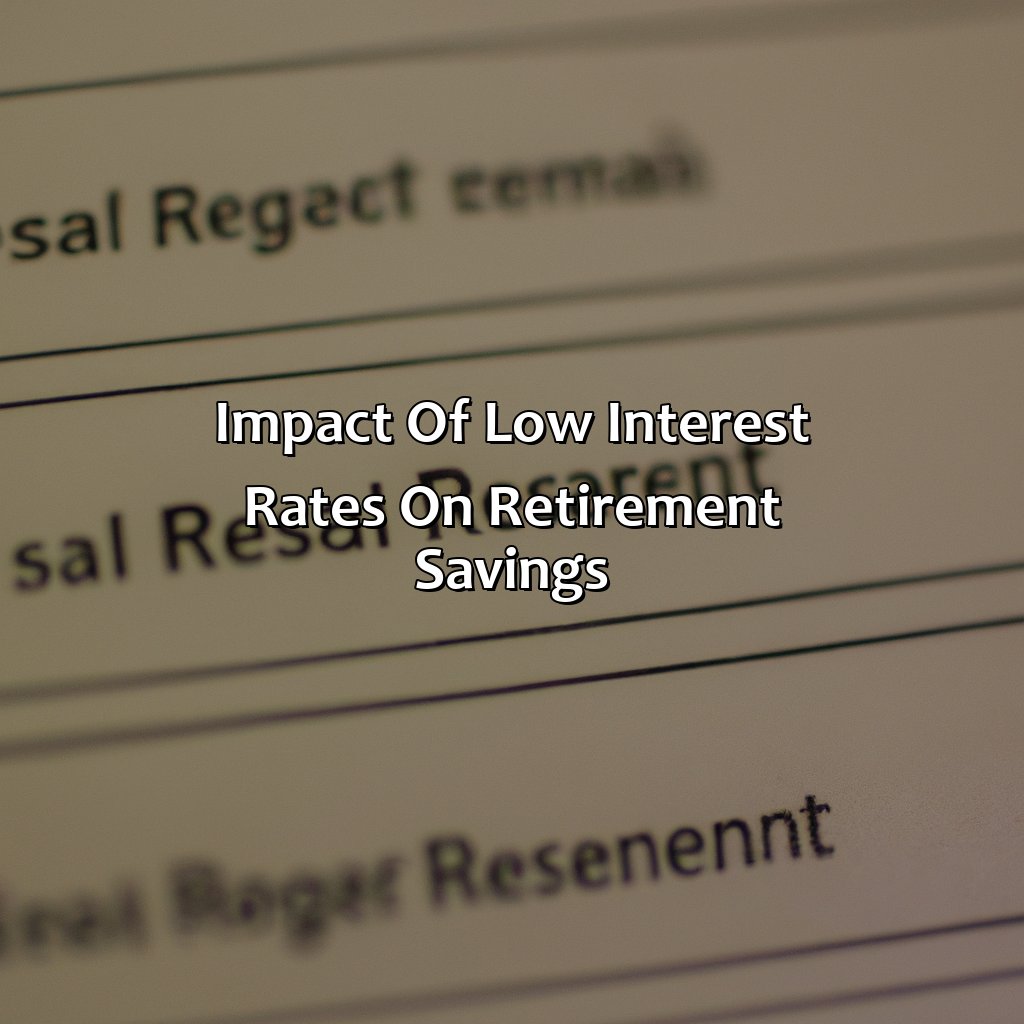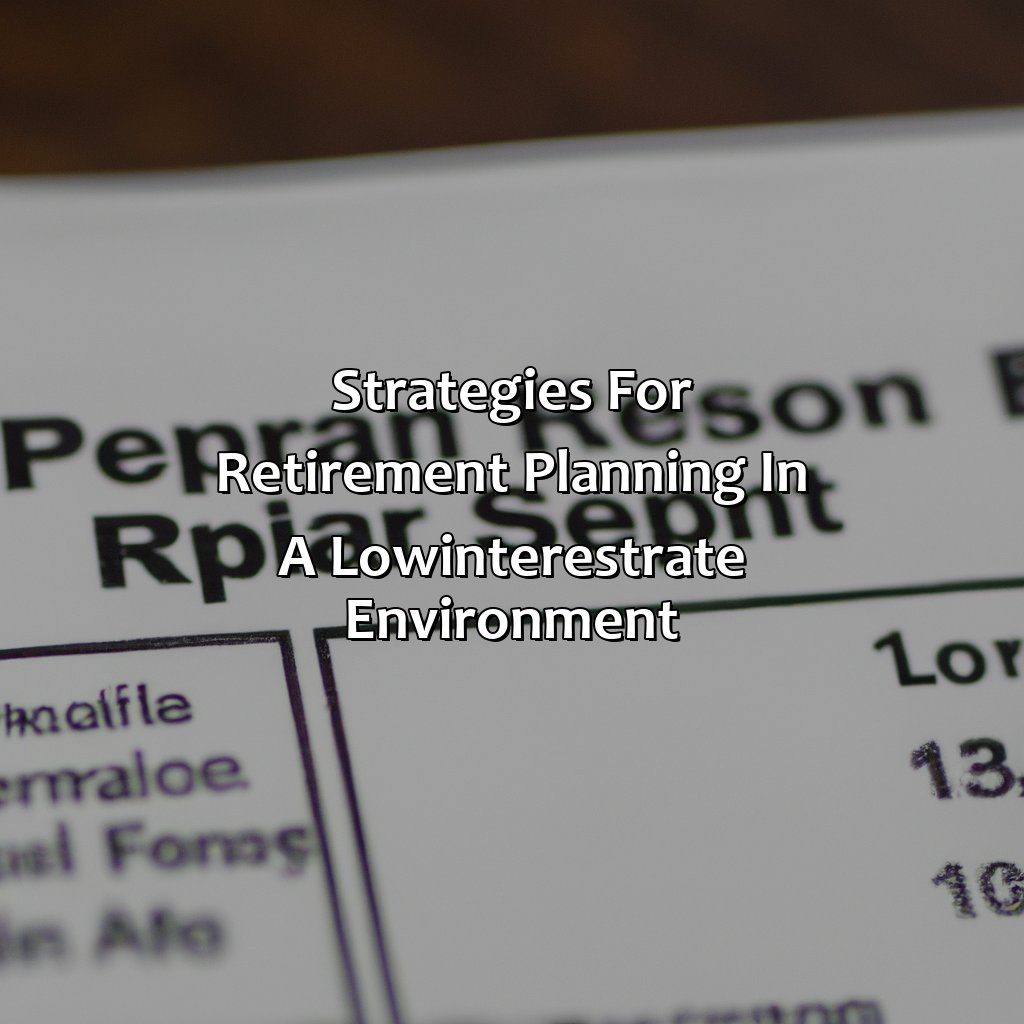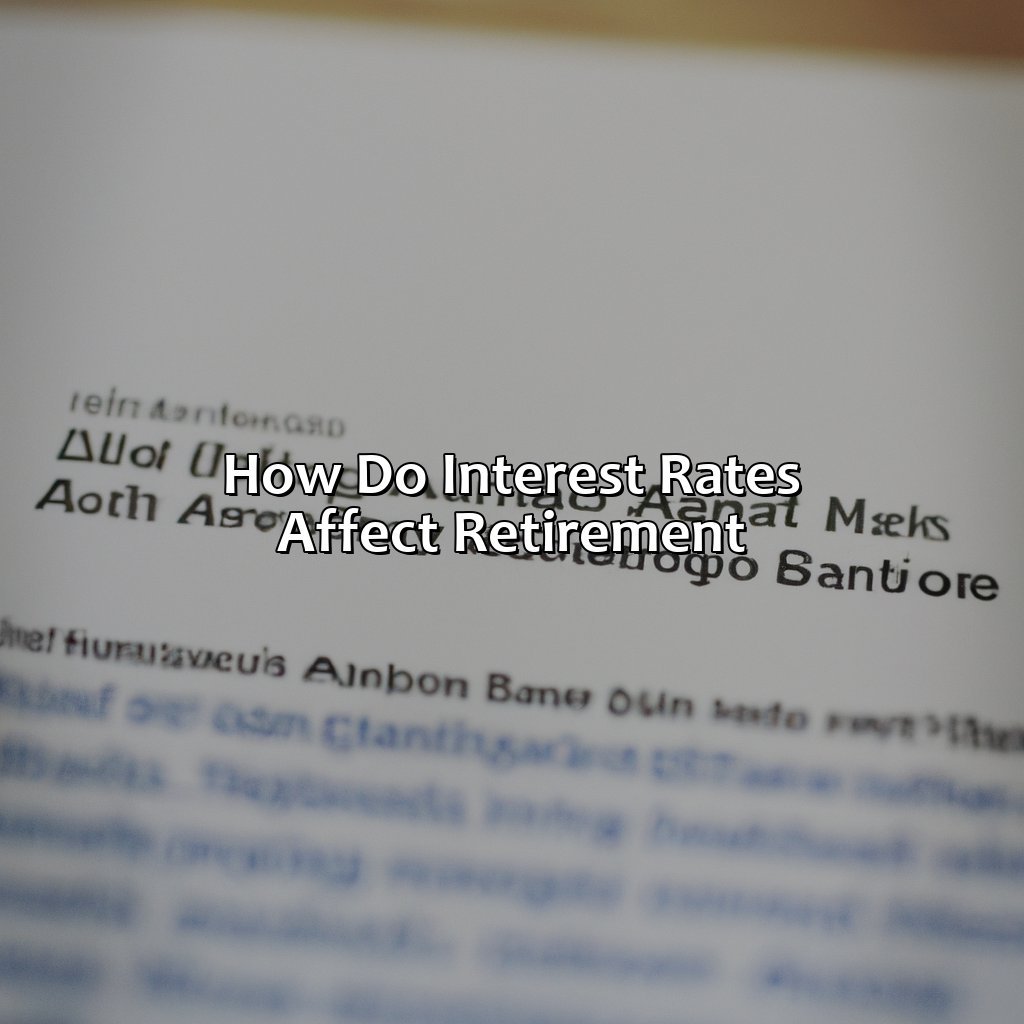How Do Interest Rates Affect Retirement?
Key Takeaway:
- Low interest rates negatively impact retirement savings: Low interest rates make it difficult for retirees to earn income from investments like savings accounts, bonds, and annuities. This can have a significant impact on retirement income and may require retirees to adjust their spending or withdraw more money from their savings.
- Diversification and alternative investments can help combat low interest rates: By diversifying their portfolio to include alternative investments, retirees can potentially earn more income while minimizing risk. Examples of alternative investments include real estate, private equity, and commodities.
Are you concerned about the impact of interest rates on your retirement? With the right information and strategies, you can make sure your nest egg is safe. In this article, we’ll explore how interest rates affect retirement.
Overview of Interest Rates and Retirement
Interest Rates and Their Impact on Retirement
Interest rates have a significant impact on retirement plans. For individuals who have invested their savings in bonds, the interest rate determines how much they will receive in return. High interest rates lead to higher returns, increasing the value of retirement savings. On the other hand, low interest rates lead to low returns that may not be enough to sustain one’s retirement. Hence, it is important to consider interest rates when planning for retirement.
Moreover, interest rates affect the borrowing capacity of retirees. High interest rates make borrowing expensive, making it difficult for retirees who rely on loans to meet their needs. In contrast, low interest rates make borrowing cheap, allowing retirees to avail credit easily.
One fact is that interest rates in the United States have been low since the 2008 financial crisis, making it challenging for retirees to sustain their retirement plans. According to the Federal Reserve, the current interest rate is set at a range of 0.0-0.25%.

Image credits: retiregenz.com by Harry Woodhock
Impact of Low Interest Rates on Retirement Savings
Low-interest rates have an effect on retirement savings. Especially, on pension plans, annuities, and fixed-income investments. Read on to learn more about this impact.

Image credits: retiregenz.com by Yuval Woodhock
Effects on Pension Plans and Annuities
Pension and Annuity Implications of Low Interest Rates:
Low interest rates present major pension and annuity implications, as these retirement vehicles involve guaranteed payouts. Actuaries will need to reassess their risk management strategies as lower yields may lead to potential shortfalls in funding. This can impact the insurance industry’s ability to offer retirement products with suitable benefits.
In addition, pension plan sponsors may face funding obligations if returns on investments fail to meet the plan’s assumptions and requirements. Decrease in interest rates affects an annuity provider’s ability to generate income on fixed-income securities, making it challenging for them to provide expected returns without exceeding underlying risk profile constraints.
It is critical that retirees understand how a low-interest-rate environment may influence their investment decisions and adjust accordingly.
Fear of Missing Out – Opportunities in Low-Interest-Rate Environments:
Although low-interest-rate environments present challenges, there are still plenty of opportunities for investors who are willing to take calculated risks. Such risks include exposure to dividend-paying equities, real estate investment trusts (REITs), or alternative asset classes such as private debt.
To capitalize on these opportunities, investors should consider working with experienced advisers who can help navigate the market complexities and tailor a portfolio that aligns with their unique goals and risk tolerance. Waiting too long may result in missed investment chances amid a slower economic recovery.
Looks like retirement savings are taking a snooze during these low interest rates, but at least your mattress can make a decent return.
Impact on Fixed-Income Investments
Fixed-Income Investments and their Vulnerability to Low Interest Rates
Fixed-income investments such as bonds, CDs, and money market funds are more vulnerable to changes in interest rates than other investments. When interest rates are low, the yield on these types of investments also decreases. This reduction alters how much income you can earn from your retirement savings.
This impact can translate into lower returns on fixed-income portfolios that many retirees depend on during their golden years. Moreover, financial experts predict that interest rates will remain low for a prolonged period, creating long-term implications for those dependent on predictable fixed-income investments.
If living off the income generated by fixed-income investments is critical to your retirement plan, you may want to consider diversifying your portfolio with real estate properties or stocks that hold up well in low-interest-rate environments. You may have to take additional risks or invest in longer-term bonds with a higher coupon rate.
An Investor’s Experience:
Rita was retired; she relied mostly on her bond investment portfolio, which consisted of government and municipal bonds with a maturity time ranging from three to ten years. When interest rates began to decline steadily over the last several years, Rita saw her fixed return plummet southwards. As the yearly income declined significantly below her monthly expenses, she had no option but to reduce her spending plan drastically.
With high interest rates, retirement planning is a breeze…unless you’re a bank, then it’s a total snooze-fest.
Impact of High Interest Rates on Retirement Planning
Understand the effect of high interest rates on retirement planning! Bond yields can increase and affect Home Equity Conversion Mortgages. This section’s all about it and how it affects your strategies. Get ready to explore the intricacies!

Image credits: retiregenz.com by Harry Arnold
Increase in Bond Yields
With the recent surge in government bond yields, retirement planning takes a new turn. Higher bond yields lead to increased interest rates, which can have a significant impact on pension funds and other retirement-related investments. The increase in bond yields may also cause a shift in the demand for different financial products, including annuities and fixed-income securities.
Investors who rely on fixed-income products may benefit from an increase in bond yields, as they would receive higher returns. However, for those who have invested in low-yield bonds or other financial products with fixed earnings, an increase in bond yields may lead to reduced earnings. The effect of this decrease will be felt especially hard by retirees or those nearing retirement as it could disrupt their well-laid plan.
In such uncertain times, investors must keep track of emerging trends and ensure that their investment portfolios remain diversified and aligned to their risk tolerance. A balanced portfolio helps mitigate risks associated with market volatilities and yield fluctuations. Stay informed and adapt to changes as necessary to minimize potential losses when opportunities arise.
As we move forward into uncharted waters with forecasts hinting at even higher interest rates looming around the corner, acting now is paramount to avoid missing out on opportunities to optimize your retirement strategy.
Retirees using their home equity for money are taking one step forward and two steps back with high interest rates on their HECM loans.
Impact on Home Equity Conversion Mortgages
Reverse Mortgage Impacts Due to High Interest Rates
The impact of high interest rates on Home Equity Conversion Mortgages (HECMs) can be significant. When interest rates rise, HECM loans become more expensive for borrowers, reducing the amount they can borrow and increasing the costs associated with the loan.
As a result, seniors may need to consider other sources of income or reduce their expenses to make up for the shortfall. This can include tapping into other retirement assets or downsizing their homes.
Furthermore, high interest rates may also impact the viability of lenders offering these loans. In some cases, lenders may choose to exit the HECM market due to reduced demand from potential borrowers.
One senior couple in California found themselves struggling with their reverse mortgage payments after interest rates rose. They were forced to sell their home and move into a smaller place to make ends meet. It’s crucial for retirees to understand these potential impacts and plan accordingly when choosing a reverse mortgage option.
Looks like we’ll have to retire in our dreams if interest rates keep falling like our hopes and dreams.
Strategies for Retirement Planning in a Low-Interest-Rate Environment
Low-interest-rates? No problem! Diversify your investment portfolio to plan for retirement. Consider alternative investments too. These strategies can help you reach your retirement goals, even in tough financial times.

Image credits: retiregenz.com by Joel Arnold
Diversify Portfolio
To maximize returns during a low-interest-rate phase, it is crucial to develop a diversified investment portfolio. A well-rounded portfolio with different investment vehicles can aid in mitigating risks and balancing potential rewards.
Strategies for diversifying the portfolio could include:
- Spreading investments among various asset classes, such as bonds, stocks, real estate, or commodities. This approach helps reduce overall risk by investing in markets that are not closely correlated with one another.
- Investors can also look into alternative investment opportunities like hedge funds or private equity firms.
- Selecting assets based on geographical variations and market sectors. Investing in a mix of domestic and international equities will allow you to lessen your exposure to the fallouts from economic events happening in any particular region.
Pro Tip: Diversification plays an essential role not just in retirement planning but across all stages of investing. The key takeaway is to develop a solid strategy by combining diverse elements into your investment plans for optimal long-term results.
Retirement planning tip: Instead of putting all your eggs in one basket, consider putting some in the wine basket – alternative investments like vineyards have a high return potential and hey, free wine for life!
Consider Alternative Investments
When it comes to retirement planning in a low-interest-rate environment, considering alternative investment options is crucial. Explore unconventional investment opportunities such as real estate, private equity, and commodities. These may offer high returns over time but come with higher risks than traditional investments.
Another viable option is annuities or life insurance policies. These often provide a guaranteed lifetime income stream that protects against market downturns. However, the fees and commissions for these products can be high, so it’s essential to understand the associated costs.
It’s also vital to diversify your portfolio beyond stocks and bonds. Investing in international markets or emerging industries may offer greater potential for growth but also comes with more risk.
Alternative investments can provide unique opportunities for retirement planning in a low-interest-rate environment. Keeping an open mind and seeking professional advice tailored to your specific financial needs can help maximize long-term gains.
According to Forbes, alternative investments only account for around 25% of institutional portfolios, despite their proven success in delivering superior returns compared to traditional investments.
Five Facts About How Interest Rates Affect Retirement:
- ✅ Higher interest rates can increase the income generated by retirement savings accounts, providing more income during retirement. (Source: SmartAsset)
- ✅ Lower interest rates can reduce the growth of retirement savings accounts, potentially requiring retirees to scale back their lifestyle or work longer. (Source: US News)
- ✅ Rising interest rates may lead to increased inflation, which can impact the purchasing power of retirement savings. (Source: Investopedia)
- ✅ Falling interest rates may lead to a decrease in the value of bonds and other fixed-income securities held in retirement portfolios. (Source: The Balance)
- ✅ A combination of both fixed and variable interest rate investments can help balance the impact of changing interest rates on retirement savings. (Source: Schwab)
FAQs about How Do Interest Rates Affect Retirement?
How do interest rates affect retirement?
Interest rates can have a significant impact on retirement savings and income. When interest rates are high, retirees can earn more on their investments and savings, which can increase their retirement income. On the other hand, when interest rates are low, retirees may earn less on their investments and savings, which can decrease their retirement income.
What type of investments are affected by interest rates?
Interest rates can affect various types of investments, including bonds, certificates of deposit (CDs), and savings accounts. These investments generate income in the form of interest, which is affected by changes in interest rates. For example, when interest rates rise, the value of existing bonds and CDs may decrease as investors demand higher yields on new investments.
Are inflation rates related to interest rates?
Yes, inflation rates and interest rates are closely related. Inflation is the rate at which the general level of prices for goods and services is rising, and it affects the purchasing power of retirement income. When inflation is high, retirees might need more income to maintain their standard of living. Interest rates are used as a tool to control inflation, as higher interest rates can increase the cost of borrowing and reduce spending.
Can interest rates impact the value of retirement accounts?
Yes, changes in interest rates can impact the value of retirement accounts. For example, if interest rates rise, the value of existing bonds and other fixed-income investments may decrease, leading to a decrease in the value of a retiree’s investment portfolio.
How do interest rates affect retirement planning?
Given the importance of interest rates in retirement planning, it’s essential for retirees to be aware of how changes in interest rates can impact their retirement income and investment portfolio. Retirees should consider their investment strategy in light of the current interest rate environment and adjust their plan accordingly. They can also consider diversifying their investments to include assets that aren’t as affected by interest rate fluctuations.
What are some strategies for managing interest rate risk in retirement?
Retirees can manage interest rate risk by investing in a mix of assets that aren’t all affected by interest rates in the same way. They can also consider investing in assets that respond well to changing interest rates, such as floating-rate bonds. Additionally, some retirees may consider purchasing an annuity that provides a guaranteed rate of return regardless of changes in interest rates.






